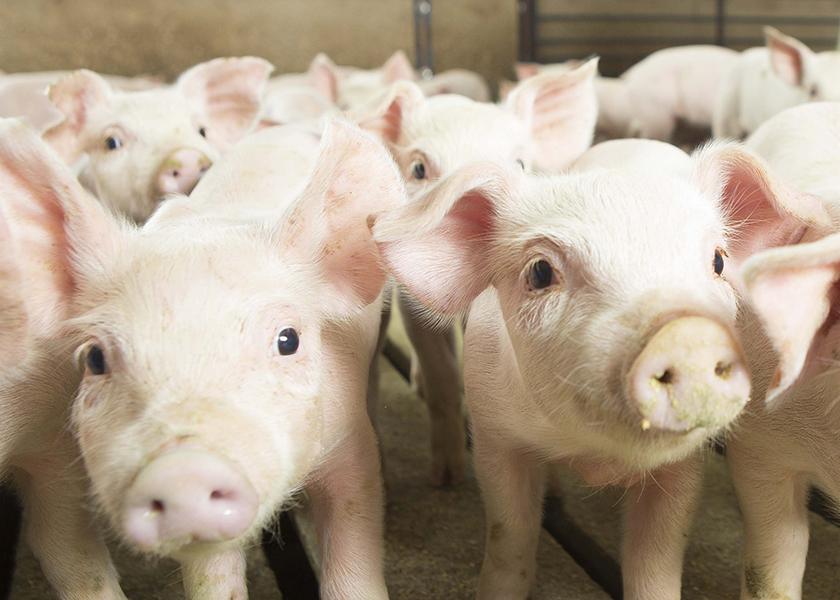PRRS Virus: Uncovering a Hidden Enemy

It’s no secret porcine reproductive and respiratory syndrome (PRRS) is a cunning enemy in swine herds across the country. New research out of the University of Minnesota College of Veterinary Medicine proves just how sneaky this virus is and these findings could lay the groundwork for more effective vaccines in the future.
“Even though there are PRRS vaccines, we know that vaccination or previous exposure to the virus only results in partial protection against reinfection,” says Cheryl Dvorak, one of the study’s lead researchers. “Part of the reason herds get reinfected is because PRRS has a very high mutation rate, and there are a high diversity of strains out there.”
In an earlier study, researchers discovered some pigs had broad protection against a variety of PRRS virus strains. Dvorak says she and other researchers set out to find out why some of these animals were broadly protected and if this is something they could make happen through vaccination.
What Causes Broad Neutralization of the PRRS Virus?
Scientists took blood samples from pigs that had already been exposed both to a modified live PRRS virus vaccine and various field isolates. Through this reverse vaccinology approach, they were able to identify memory B cells — the cells that create antibodies — that were able to bind to PRRS virus, those that were able to neutralize the virus, and which viral proteins were bound by these B cells and their antibodies.
“Looking at the antibodies, we found that four of the antibodies were able to bind the GP5 protein of the virus, which has been observed in the past to be involved in protection against PPRS virus – like a neutralization target,” Dvorak says.
What they didn’t find in the memory B cells is an antibody against the GP2-GP3-GP4 complex, which is important for the virus to be able to enter the macrophage to cause infection.
“We believe these antibodies to this complex are a lot less common. We want to see if we can find any antibodies to this complex, and then determine if antibodies to this complex are what induce the broadly protective antibody response,” she says. “We believe these are more important for viral neutralization, because you have to have this interaction for the virus to enter the macrophage. If we can get that interaction blocked with antibodies, we think that that is going to be what causes this broad neutralization.”
A Game of Hide and Seek
PRRS antibody protection is very specific, the team discovered. Research shows the PRRS virus is able to essentially go around this antibody-based protection. Dvorak believe the PRRS virus has epitopes that it makes the immune system look at and respond to. Meanwhile, something else is hiding.
“We think the PRRS virus is being a little bit sneaky saying, ‘This is the most important to fight.’ But in fact, it has two important things you need to fight. It’s hiding the other one.”
Dvorak says that trickiness is why PRRS vaccines don’t always work as well as most viral vaccines work.
“The PRRS virus actually has the GP5 complex, which is important, but it also has this GP2-GP3-GP4 complex, which we think might actually be more important, but is somehow more hidden from the immune system,” she says.
What’s Next?
Discovering this new method to isolate and identify antibodies and the B cells that produce them could result in many future breakthroughs for other pathogens as well.
“Because we were able to develop this method, we now have more tools available to us to help us increase our knowledge of PRRS virus-specific immunity in pigs. By continuing this research and doing more experiments, we hope to identify specific targets on the virus that are important for inducing this broadly protective immune response,” Dvorak says.
However, this study just barely skimmed the surface of the antibodies present in pigs, she explains. She wants to dig deeper and isolate more antibodies.
“In the end, we hope the research will lead to vaccines that induce broadly neutralizing antibodies so they're effective against diverse PRRS virus strains,” Dvorak says. “This will make the vaccines more protective against reinfection, ultimately decreasing the incidence of PRRS virus infection and its effect on the swine industry.”
This study, “Isolation of Porcine Reproductive and Respiratory Syndrome Virus GP5-Specific, Neutralizing Monoclonal Antibodies from Hyperimmune Sows,” was published in Frontiers in Immunology. Other researchers include the late Michael Murtaugh and Jordan Young from the University of Minnesota and Simon Graham from The Pirbright Institute.
More from Farm Journal's PORK:
PRRS: Deciphering the Mystery Disease
Put PRRS Strain 1-4-4 Lineage 1C in Perspective
Gut Microbiome Key to Respiratory Vaccine Response in Pigs
PRRS Beyond 2020: The Fight Isn’t Over
Pirbright Explores Development of New PRRS Vaccine Candidates







